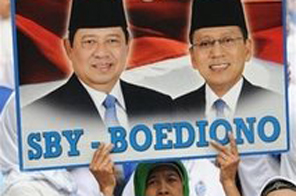Stage set for Indonesia polls
JAKARTA: Indonesia is set to vote in only its second direct presidential election since the fall of the Suharto dictatorship, with incumbent Susilo Bambang Yudhoyono expected to win another five-year term.
The liberal ex-general is hoping to avoid a run-off in September by beating opposition leader Megawati Sukarnoputri and outgoing Vice President Jusuf Kalla with a clear majority in the first round.
Most opinion polls indicate he has enough support to avoid a run-off, although some have pointed to a much closer race with Yudhoyono facing either Megawati or Kalla in a second-round decider.
Hundreds of thousands of police have been deployed across the vast, mainly Muslim archipelago to safeguard polling stations, especially in Papua where ethnic tensions are high and violence marred legislative polls in April.
Last-minute disputes over inaccurate voter lists were settled after Megawati -- an ex-president and daughter of independence hero Sukarno -- obliquely suggested Yudhoyono's supporters were trying to rig the vote.
In a dramatic ruling late Monday, the Constitutional Court changed voter registration rules to allow Indonesians left off the rolls to cast their ballots with identity cards.
"Let's make the election a success. Don't let the world see improper things happening in Indonesia," Yudhoyono said in response to the ruling.
Speaking to provincial governors on Tuesday, he called for a "smooth presidential election that is truly honest, fair, direct, free and secret."
Megawati called on Indonesians to vote with a "clear and honest mind".
"We are convinced that we can create a better future," she said.
Yudhoyono's popularity is based on five years of steady economic growth in Southeast Asia's biggest economy, slow but even-handed reform of the bureaucracy and a tough anti-corruption drive.
He has also weathered the global financial meltdown, with strong domestic demand underpinning growth at around four percent this year.
If he wins, the 59-year-old known simply as SBY -- who likes to write love songs in his spare time -- would be the first president to serve consecutive terms at the helm of the world's third-biggest democracy after India and the United States.
His centrist Democratic Party tripled its vote in April's polls to become the largest party in parliament, allowing him to hand-pick a loyal cabinet of technocrats to speed up his reform agenda if he is re-elected.
Despite his popularity, Yudhoyono has been criticised for caving in to Islamist extremists over tolerance issues such as a controversial anti-pornography law and restrictions on the minority Ahmadiyah sect.
But his government has worked closely with the United States and Australia to crack down on Al-Qaeda inspired fanatics who launched the 2002 Bali bombings and other atrocities.
Three of the Bali bombers were executed by firing squad last year and hundreds of other terror suspects have been rounded up.
Security issues have barely rated in the election debate, which has been fought over issues such as corruption, food prices and Indonesia's response to the pressures of globalisation.
Megawati and Kalla have both touted a brand of economic nationalism in response to what they have called Yudhoyono's "neo-liberalism", vowing to protect jobs from foreign competition and investment.
The presence of Suharto-era generals on all three tickets shows the lingering power of the old military elite in Indonesia, analysts said.
Megawati teamed up with notorious special forces ex-commander Prabowo Subianto as her running mate, while Kalla chose former military chief Wiranto, who has been indicted by United Nations prosecutors for crimes against humanity over East Timor's bloody independence referendum in 1999.
Yudhoyono, who was a senior general under Suharto but emerged from that regime with his reputation intact, chose Western-educated economist and former central bank chief Boediono as his vice-presidential candidate.






